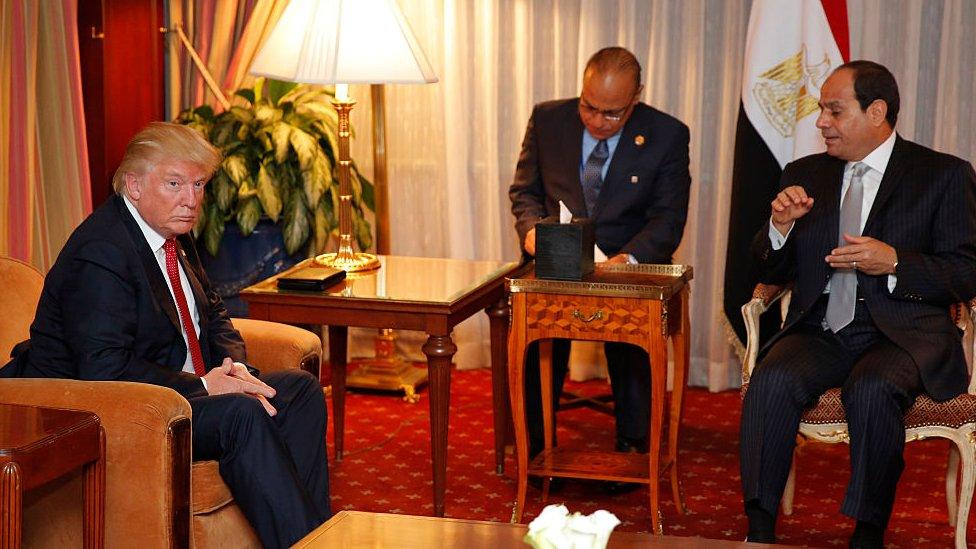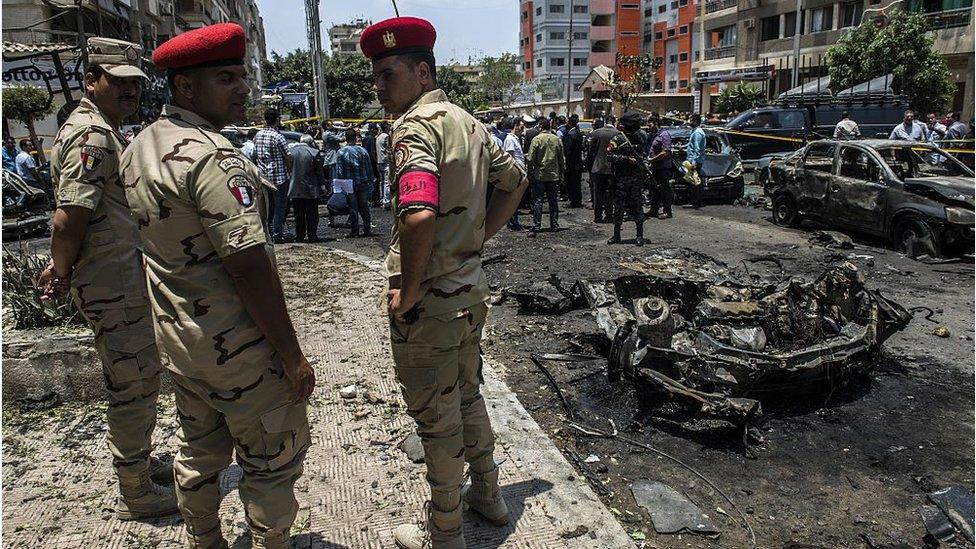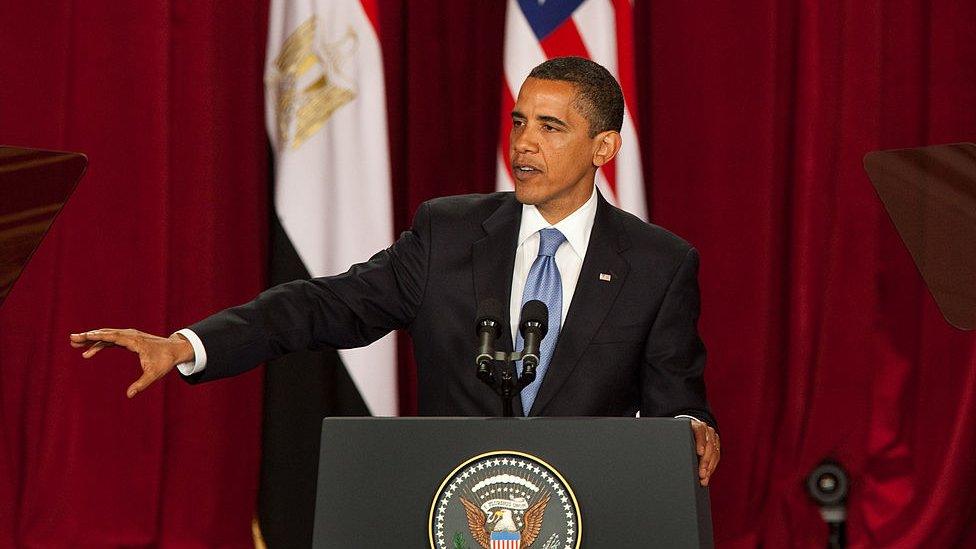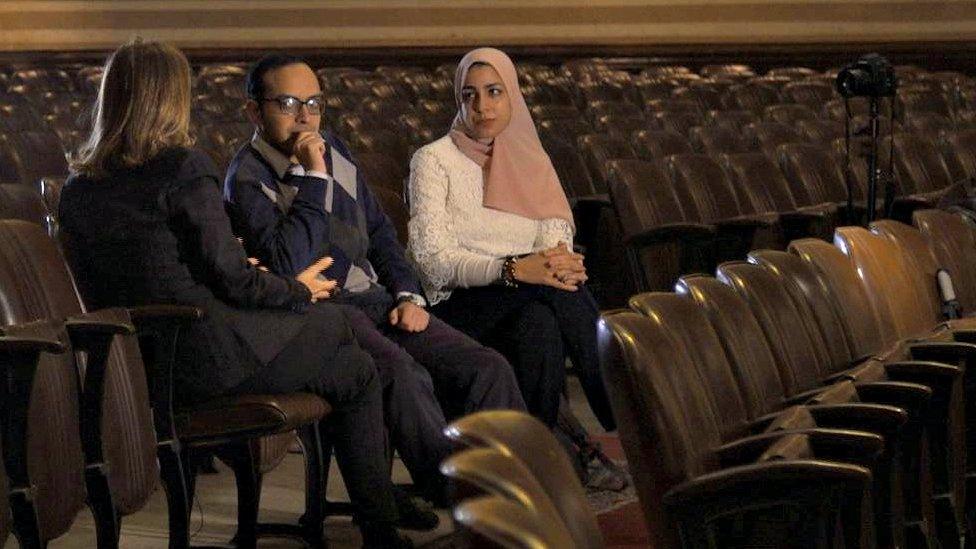Trump era heralds warming of US-Egypt ties
- Published

Donald Trump has praised Abdul Fattah al-Sisi as a "fantastic guy"
As President Donald Trump tries to re-instate his controversial travel ban, there is one thing he does not need to worry about - any opposition from Egypt.
When President Trump decided to temporarily close America's borders to citizens of seven mainly Muslim nations, the response from Cairo was striking.
The Arab world's most populous nation made its silence felt. Egypt's hardline leader, and his supporters, are on the Trump train.
President Abdul Fattah al-Sisi was the first Arab leader to congratulate Mr Trump on his election victory. The bromance began at their first meeting in New York last September, when Donald Trump was still on the campaign trail.
"There was good chemistry there," Mr Trump said afterwards. "He's a fantastic guy." He praised the general-turned-president for "really taking control of Egypt" as indeed he did - in a popularly backed coup in 2013.
While the US did not call it a coup, the military's removal of Egypt's first democratically elected president - the Islamist Mohammed Morsi - caused a rupture with President Obama. Now President Sisi is looking forward to a reset in relations, and a visit to the White House - which the Obama administration denied him.
Common ground
When he gets there (the visit is still being planned) human rights are unlikely to be on the agenda. Neither leader has much to say about that, but they speak the same language about tackling Islamic extremism.
President Trump has vowed to wipe "radical Islamic terrorism" from the face of the Earth. President Sisi has promised to "combat and eradicate terrorism and extremism".

Egypt and the new US administration see fighting militancy as a priority
He is battling a militant insurgency that originated in Northern Sinai but has bled beyond it. President Trump called him recently, promising to provide the necessary support. (Egypt is already the second biggest recipient of US military aid, receiving about $1.3bn a year)
The Egyptian leader has praised his US counterpart for showing a "deep and great understanding of the region" - which may come as a surprise to many in the Middle East.
Critics here argue that Mr Trump's immigration curbs - now suspended by a US judge - are racist and will backfire.
"I think truly he is playing into the hands of the extremist," said Khaled Dawoud, a liberal activist. "He is antagonising the majority or nearly all Muslims worldwide. That's exactly what Daesh [so-called Islamic State] and other extremist groups want to do, to push towards a confrontation, to send the message that… the two civilisations cannot exist."
Promise unfulfilled
The message from Barack Obama, in the early days of his presidency, was very different. At Cairo University in June 2009 he made a seminal appeal for civilisations to unite.
"I've come here to Cairo to seek a new beginning between the United States and Muslims around the world," he said, "one based on mutual interest and mutual respect. This cycle of suspicion and discord must end."
Nadine Medhat, then a 19-year-old student, was in the audience that day listening to his soaring rhetoric beneath the gilded dome of the University's Great Hall.

In 2009, Barack Obama spoke of hope for a "new beginning" for US-Muslim relations
Ms Medhat, now a researcher, came back there to give us her views on US presidents, past and present.
"I remember very distinctly all the young people attending on the day were excited," she said. "I felt that the writing and the wording of the speech was very carefully chosen and it resonated with many who listened."
In spite of the early promise, she says President Obama left the region worse than he found it.

Mamdouh Abdo and Nadine Medhat are worried by what the Trump presidency will mean
As for Donald Trump she told us he could not even get his wording right during his campaign.
"I thought his words were insensitive to Muslim communities worldwide," she said. Ms Medhat is troubled by his repeated threats to "take the oil" in Iraq, and by his "rash decisions" so far.
"We are all waiting to see how things will unfold, " she said. "This first week has been a bit rough, I would say, particularly for the seven banned Muslim-majority countries, also other countries in the region who are concerned for what will happen next. So we are all just bracing ourselves."
Message to Trump
Many here are pessimistic about the Trump presidency, like Dr Tamer Mamdouh Abdo, a lecturer in engineering.
He, too, heard Barack Obama speak in person, and is urging his successor to get back to first principles.
"Look at the US constitution," he said "and stick to the American values of freedom and democracy because what you are doing is very dangerous not only to the US but to the whole world."
Should President Trump ever come to speak at Cairo University both he and Ms Medhat said they would probably stay home.